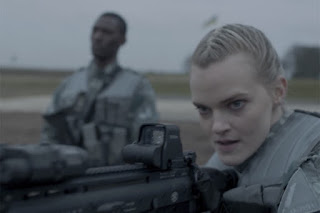 |
| Hayley Atwell and Domhnall Gleeson in the Series 2 premier of Black Mirror, "Be Right Back" |
Some episodes of Black Mirror are absolutely captivating start to finish, with a great mix of mystery, strong writing and exceptional story delivery. Other episodes leave you with udder shock with a final intriguing twist. And then, there are episodes like "Be Right Back," the premier episode of the second series.
This episode is in many ways more sparse than other episodes. The tone is soft and somber, and generally less shocking, and only lightly mysterious. The story deals with a woman who's husband dies and she is left alone until a friend introduces her to a technology that will allow her to connect with a simulated version of her husband based on a collection of his online footprint.
This episode is one that upon watching it I was surprised to find how often I thought about it after seeing it. The episode grew richer the longer I had waked away from it. There were certain aspects of this episode that were quite interesting in that the replicated husband was close, but not close enough.
Obviously, there has been plenty said about the dissidence between our online self and our actual self,but this episode was not preachy, it had the perfect simple man, Ash (played by Domhnall Gleeson) who wasn't presenting himself on social media as anything dramatically different from his actual self and so the similarity that was able to be established was very very close, just not quite an exact replica.
Series creator and writer Charlie Brooker could have gone for broke with a dramatic revelation that Ash was someone that his wife didn't know, or gone from some horrific twist, but the Brooker went for understated and sincere. As a result the differences between a replicated Ash and the real Ash are simple items.
Brooker's premise in this episode is not that we should present a true version of ourselves, for example one of the items that replicated Ash does not know about the real Ash is sexually intimate details. This is not presented as a criticism but as a simple gap that would be expected in this type of fantasy technology.
As such, this episode doesn't just make you ask about your own gaps in your online and real self (and those around you), but also makes you asks which parts of yourself are okay to be left to real life. The episode also asks the question if you were to die what do you leave behind to your loved one's in your own online foot print -- a very new question, only barely discussed and explored.
Brooker writes a heartfelt episode in "Be Right Back" that asks some very real questions, questions worth lingering on, and in the case of this episode my appreciation for it grew only after concluding the episode.
This posts is part of Black Mirror Week on StrangecultureBlog.com. Click here to see the other posts part of this series.





















